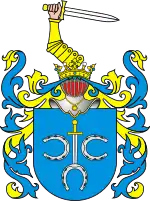Andrzej Węgierski
Andrzej Węgierski (born 16 November 1600 in Ostroróg; died 11 January 1649 in Orzeszkowo) was a Polish Calvinist historian,[1] preacher, poet and translator.
Andrzej Węgierski | |
|---|---|
| Coat of arms | Belina |
| Born | 16 November 1600 Ostroróg, Kingdom of Poland |
| Died | 11 January 1649 (aged 48) Orzeszkowo, Kingdom of Poland |
| Noble family | Węgierski |
| Father | Wacław Węgierski |
He came from the Węgierski noble family of Belina coat of arms, descending from the village of Węgierki in Greater Poland. He attended schools in Ostroróg, Leszno and Bytom Odrzański. From 1633 to 1648 he was the minister of the Calvinist congregation in Włodawa.
His main work was the Slavonia reformata, continentes historiam ecclesiasticam (1st Ed Germany 1652, 2nd Ed. Amsterdam 1679, modern edition Warsaw 1973[2])[3] In this he gives the history of both the Calvinist ecclesia major and Antitrinitarian (Arian or Socinian) ecclesia minor of the Polish Brethren.[4][5][6][7]
References
- Peter Brock The political and social doctrines of the Unity of Czech Brethren 1957 "But a leading Polish Protestant historian and preacher, Andrzej Węgierski (1600-49), writing under the name of Adrianus Regenvolscius, produced a large volume devoted to the history of the church in the Slav countries."
- A. Węgierski, Libri quattuor Slavoniae reformatae, Varsoviae 1973,s. 419-420
- George Huntston Williams, F. Forrester Church, Timothy George Continuity and discontinuity in church history 1979 "... landmarks of history like the second edition of Slavonia reformata by the Polish Calvinist, Andrzej Wegierski (1679)"
- Henryk Gmiterek, essay Andrzej Węgierski – nadbużański intelektualista z XVII w., in Życiorysy w trzy kultury wpisane. Włodawskie biografie, ed. Marek Bem and Adam Duszyk, Radom - Włodawa 2008. pp73-84.
- J. Tazbir, Andrzej Węgierski - historyk słowiańskiej reformacji, in Ars historica. Prace z dziejów powszechnych i Polski, Poznań 1979, pages. 603-616
- Wacław Urban, Epitalamia i epitafia pastorskiej rodziny Węgierskich w XVII w., in Wesela, chciny i pogrzeby w XVI-XVIII w., ed. Henryk Suchojad, Warsaw 2001, pp.167-172
- Wacław Urban, Rola braci Węgierskich w podtrzymywaniu protestantyzmu polskiego, in Religia, edukacja, kultura. Księga pamiątkowa dedykowana Profesorowi Stanisławowi Litakowi, ed. M. Surdacki, Lublin 2002, pp.47-51.
This article is issued from Wikipedia. The text is licensed under Creative Commons - Attribution - Sharealike. Additional terms may apply for the media files.
